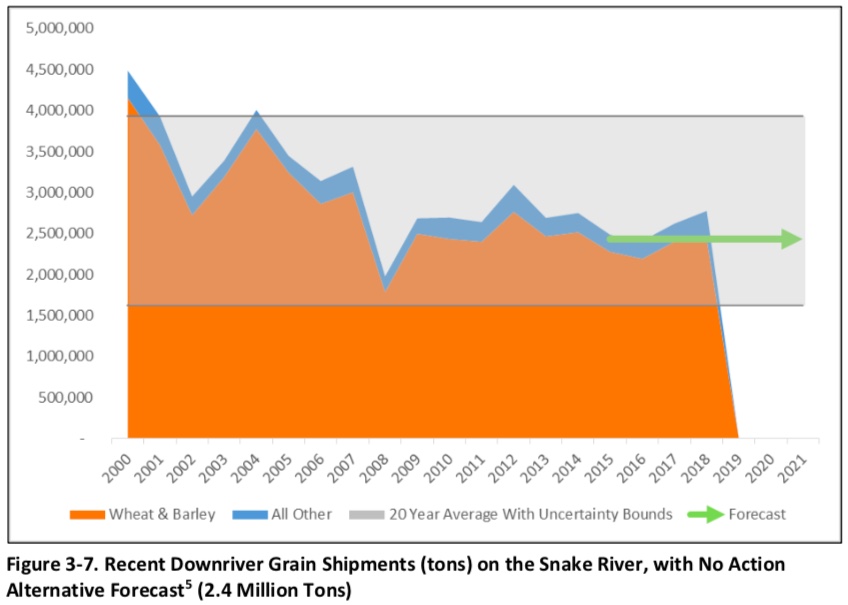forum
library
tutorial
contact

Proposed Legislation Would Protect
Snake River Dams and Export Efficiency
by Wheat Letter Blog
U.S. Wheat Associates, April 24, 2023
|
the film forum library tutorial contact |

|
Proposed Legislation Would Protect
by Wheat Letter Blog
|
Scientific evidence conducted by the U.S. government has proven that removing
the Snake River dams goes against environmental statutes and public interests."
-- Michelle Hennings, executive director of the Washington Association of Wheat Growers
 In March, U.S. Representatives Dan Newhouse (R-WA) and Cathy McMorris Rodgers (R-WA) introduced the Northwest Energy Security Act to protect four lower Snake River Dams. Senators Jim Risch (ID) and Steve Daines (MT) introduced a companion bill in the Senate. While the legislation focuses mainly on the benefits of hydroelectric power, protecting the lock and dam system will also preserve efficient barge delivery of U.S. wheat to export elevators in the Pacific Northwest.
In March, U.S. Representatives Dan Newhouse (R-WA) and Cathy McMorris Rodgers (R-WA) introduced the Northwest Energy Security Act to protect four lower Snake River Dams. Senators Jim Risch (ID) and Steve Daines (MT) introduced a companion bill in the Senate. While the legislation focuses mainly on the benefits of hydroelectric power, protecting the lock and dam system will also preserve efficient barge delivery of U.S. wheat to export elevators in the Pacific Northwest.
These members of Congress and Pacific Northwest wheat leaders provided the following comments about the effort to protect Snake River dams.
Region Cannot Afford to Lose Dams
"The four lower Snake River Dams are integral to flood control, navigation, irrigation, agriculture, and recreation in Central Washington and throughout the Pacific Northwest--to put it simply, we cannot afford to lose them," said Rep. Newhouse. He also expressed concern regarding the amount of non-scientific information being used to mislead people regarding the dams.
"A comprehensive, scientific process made clear dam breaching on the lower Snake River is completely unnecessary and unwarranted," said Senator Risch. "With the Northwest Energy Security Act, Congress will ensure the Columbia River Power System continues to provide reliable and clean energy and supports the region's transportation, agriculture, and irrigation needs."
River Transportation Essential for Wheat
Grain barge navigation on the Columbia Snake River System is an essential part of a logistical web that moves over half of all U.S. wheat exports to more than 20 Pacific Rim countries including some of the largest U.S. wheat buyers in the world. The Snake River moves more than 10% of all wheat that is exported from the United States. Barging is also the most environmentally sound and efficient mode of transportation in the region, benefiting farmers and overseas buyers by helping keep export basis lower.
This is why U.S. Wheat Associates (USW), state wheat commissions, the National Association of Wheat Growers and state wheat associations strongly support the sustainability and reliability of wheat transportation by barge.
"The Washington Grain Commission supports continued efforts to maintain the Snake River dams as an essential piece of the larger Columbia River System," said WGC CEO Casey Chumrau. "Washington farmers rely on the river system to transport more than half of the state's wheat and access overseas export markets. Barging is the most environmentally sound and economically viable mode of transportation in the region and critical to the competitiveness of Washington farmers."
"The importance of the four lower Snake River dams to our region's farmers and rural communities for both transportation and energy production cannot be overstated," said Bryan Searle, president of the Idaho Farm Bureau Federation. "The science is clear that salmon and dams can co-exist, and therefore we support the Northwest Energy Security Act. The members of the Idaho Farm Bureau Federation thank the sponsors of the bill."
"The Snake River dams are vital to Washington's wheat growers," said Michelle Hennings, executive director of the Washington Association of Wheat Growers. "Scientific evidence conducted by the U.S. government has proven that removing the Snake River dams goes against environmental statutes and public interests. Washington wheat growers support any efforts that ensure the dams continue to operate as an integral part of the Columbia River System."
"The Washington Grain Commission supports continued efforts to maintain the Snake River dams as an essential piece of the larger Columbia River System," said WGC CEO Casey Chumrau. "Washington farmers rely on the river system to transport more than half of the state's wheat and access overseas export markets. Barging is the most environmentally sound and economically viable mode of transportation in the region and critical to the competitiveness of Washington farmers."
"The importance of the four lower Snake River dams to our region's farmers and rural communities for both transportation and energy production cannot be overstated," said Bryan Searle, president of the Idaho Farm Bureau Federation. "The science is clear that salmon and dams can co-exist, and therefore we support the Northwest Energy Security Act. The members of the Idaho Farm Bureau Federation thank the sponsors of the bill."
"The Snake River dams are vital to Washington's wheat growers," said Michelle Hennings, executive director of the Washington Association of Wheat Growers. "Scientific evidence conducted by the U.S. government has proven that removing the Snake River dams goes against environmental statutes and public interests. Washington wheat growers support any efforts that ensure the dams continue to operate as an integral part of the Columbia River System."
learn more on topics covered in the film
see the video
read the script
learn the songs
discussion forum
